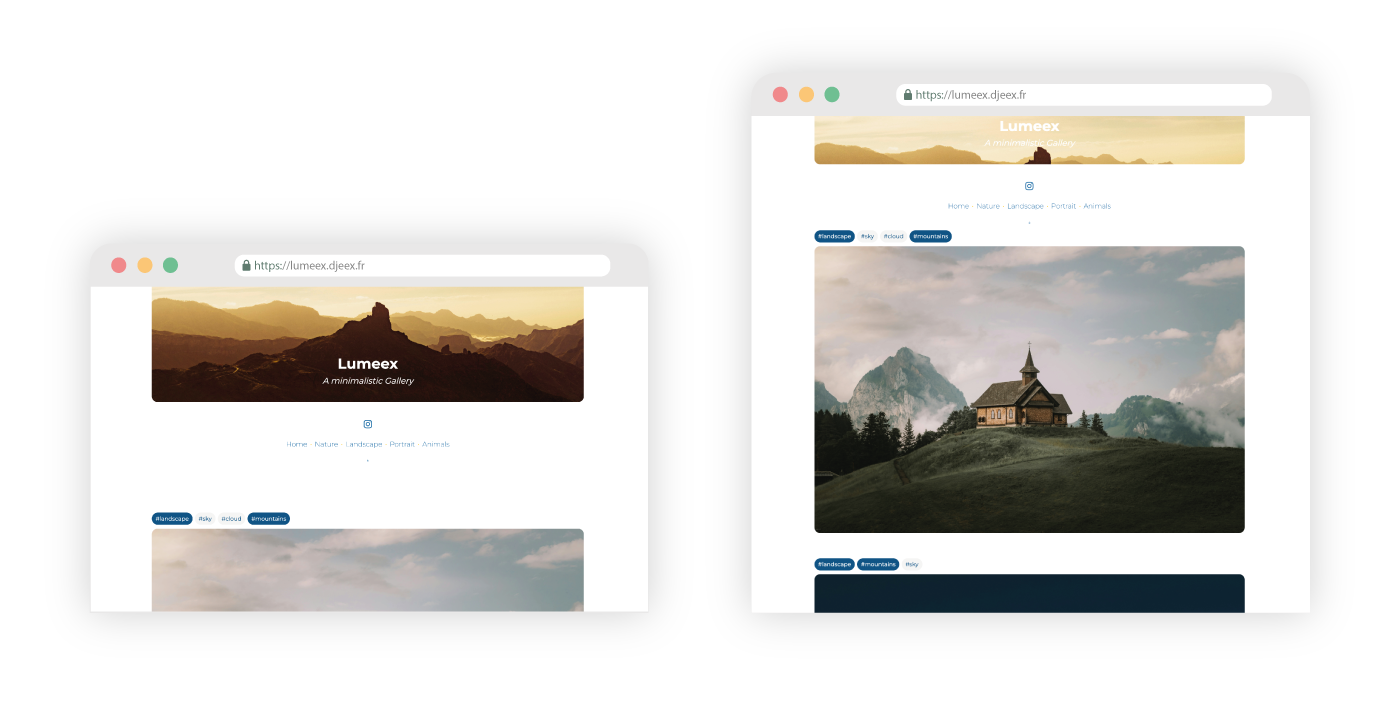Reviewed-on: #1
Lumeex
Lumeex - Yet another minimalist photo gallery with a static site generator.
Lumeex is a static site generator that builds a minimalist photo gallery. The project was born from the need to create a gallery focused more on the artworks than the author, while allowing users to organize works using tags and share filtered views. In this spirit, each page load displays the photos in random order, allowing users to discover new content they might not have seen before.
The project comes with two themes: one modern, the other more minimalistic, both designed to keep the focus on the artworks:
Note
This GitHub repository is a mirror of https://git.djeex.fr/Djeex/lumeex. You’ll find the complete package, history, and release notes there. An LLM is used for bug checking.
📌 Table of Contents
Features
Gallery (Static Website)
- Photos displayed in a random order on each page load.
- Tag-based filtering (with the ability to combine multiple tags).
- Shareable URLs with active tag filters.
- A photo carousel on the landing page.
- A legal notice page.
- Two visual themes (easily customizable):
- Supports Google Fonts and local fonts.
No-Code Builder Based on YAML Files
- YAML files to configure site information, SEO, colors, fonts, etc.—no code needed
- YAML files to reference and tag photos—no code needed.
- (Optional) Automatically add photos to the reference file.
Simple Build Process
- Compiles from YAML config files (theme selection, template building, fonts, colors, etc.).
- Automatically converts the favicon to all required formats.
- Automatically resize social thumbnail
- (Optional) Automatically resizes photos to a max width of 1140px.
- (Optional) Converts images to WebP for better performance.
- Outputs a fully generated static website, ready to be copied to any web server.
Python Installation
Instructions to run the Python scripts directly.
Requirements
- Python 3.11 or higher
- PyYAML
- Pillow
Installation
git clone https://git.djeex.fr/Djeex/lumeex.git
cd lumeex
python3 -m venv .venv
source .venv/bin/activate
pip install -r requirements.txt
You're ready to go!
Configuration
All user configuration files are located in the config folder.
Lumeex/
└── config/
├── photos/
│ ├── gallery
│ └── hero
├── themes/
│ ├── modern
│ └── typewriter
├── gallery.yaml
└── site.yaml
photos/
gallery/: place your gallery photos here.hero/: place carousel photos for the homepage here.
Tip
You can use
gallery.pyto automatically reference all photos ingallery/andhero/intogallery.yamlandsite.yamlby runningpython3 gallery.pyfrom thelumeexdirectory.
You’ll just need to tag the photos ingallery.yaml.
site.yaml
This file contains all your site’s metadata and settings. For example:
info:
title: your title
subtitle: your subtitle
description: your description
canonical: all, your, keywords
author: you
google_analytics_id: G-XXXXXXX # optional
social:
instagram_url: https://www.instagram.com/yourprofile
thumbnail: gallery/anyphoto.png # put the path from your photo folder to your file
menu:
items:
- label: your_home
href: /
- label: your_second_menu
href: /?tag=yourtag1
- label: Your_third_menu
href: /?tag=yourtag2
hero:
images:
- src: hero/your_photo_1.jpg
- src: hero/your_photo_2.jpg
- src: hero/your_photo_3.jpg
footer:
copyright: Copyright © 2025 – You
legal_link: '/legals.html'
legal_label: Legal notice
build:
theme: modern
convert_images: false
resize_images: false
legals:
hoster_name: Your_hoster
hoster_adress: Your hoster address
hoster_contact: Your hoster contact
intellectual_property:
- paragraph: "Your text here"
- paragraph: "Your second paragraph here"
- paragraph: "Etc..."
gallery.yaml
Use this file to reference the images in photos/gallery/. You can do this manually or automatically by running python3 gallery.py. You can also assign tags to the photos here.
images:
- src: gallery/your_photo_1.jpg
tags: ["portrait"]
- src: gallery/your_photo_2.jpg
tags: ["portrait", "sunset", "boat"]
- src: gallery/your_photo_3.jpg
tags: ["landscape", "sea", "beach", "sand"]
themes/
themes/
└── yourtheme/
├── fonts (optional)
├── theme.yaml
├── theme.css (optional)
└── favicon.png
Lumeex is shipped with two prebuilt themes:
You can edit existing themes or create your own. Each theme can include:
- Required: a
theme.yamlfile for visual settings (colors, fonts, etc.) - (Optional) a
theme.cssfile for additional styling - (Optional) a
fontsfolder for local fonts - (Optional) a square
favicon.png(min 196px) that will be automatically converted to all required formats.
Example theme.yaml:
colors:
primary: '#0065a1'
primary_dark: '#005384'
secondary: '#00b0f0'
accent: '#ffc700'
text_dark: '#333'
background: '#fff'
browser_color: '#fff'
favicon:
path: favicon.png
google_fonts:
- family: Lato
weights:
- '200'
- '400'
- '700'
- family: Montserrat
weights:
- '200'
- '400'
- '700'
fonts:
primary:
name: Lato
fallback: sans-serif
secondary:
name: Montserrat
fallback: serif
Build the Site
Once everything is configured, make sure you're in the lumeex directory and your Python virtual environment is activated (source .venv/bin/activate).
- (Optional) Run
python3 gallery.pyto auto-fillgallery.yamland add carousel photos tosite.yaml. Don't forget to add tags to your photos ingallery.yaml. - Run
python3 build.pyto generate the static site. - (Optional) Serve locally with:
python3 -m http.server 3000 --directory .output
Then visit http://localhost:3000 or, if remote, http://your-server-ip:3000.
Warning
Use this only to test your site. Don't use python server for production !
- Finally, copy the contents of the
.output/directory to your favorite web server.
